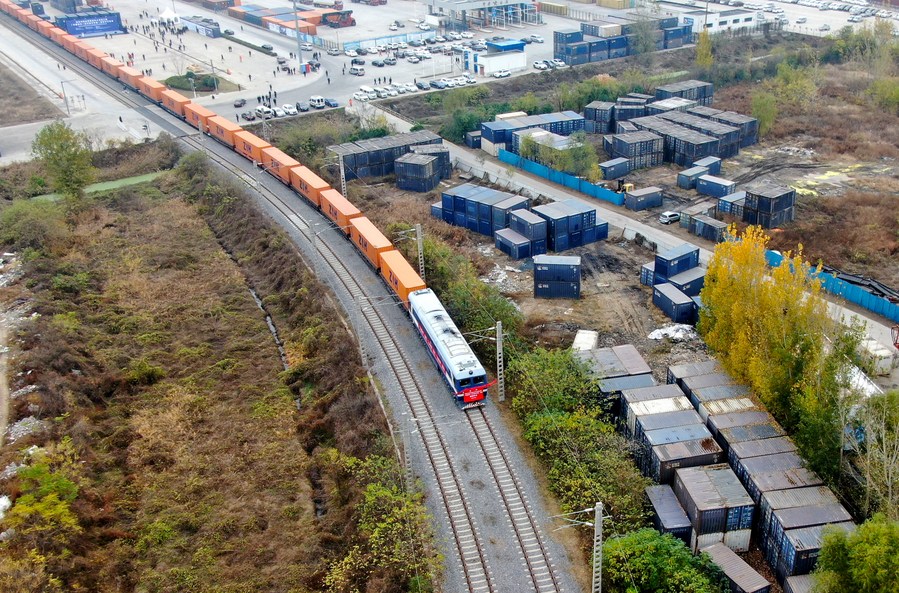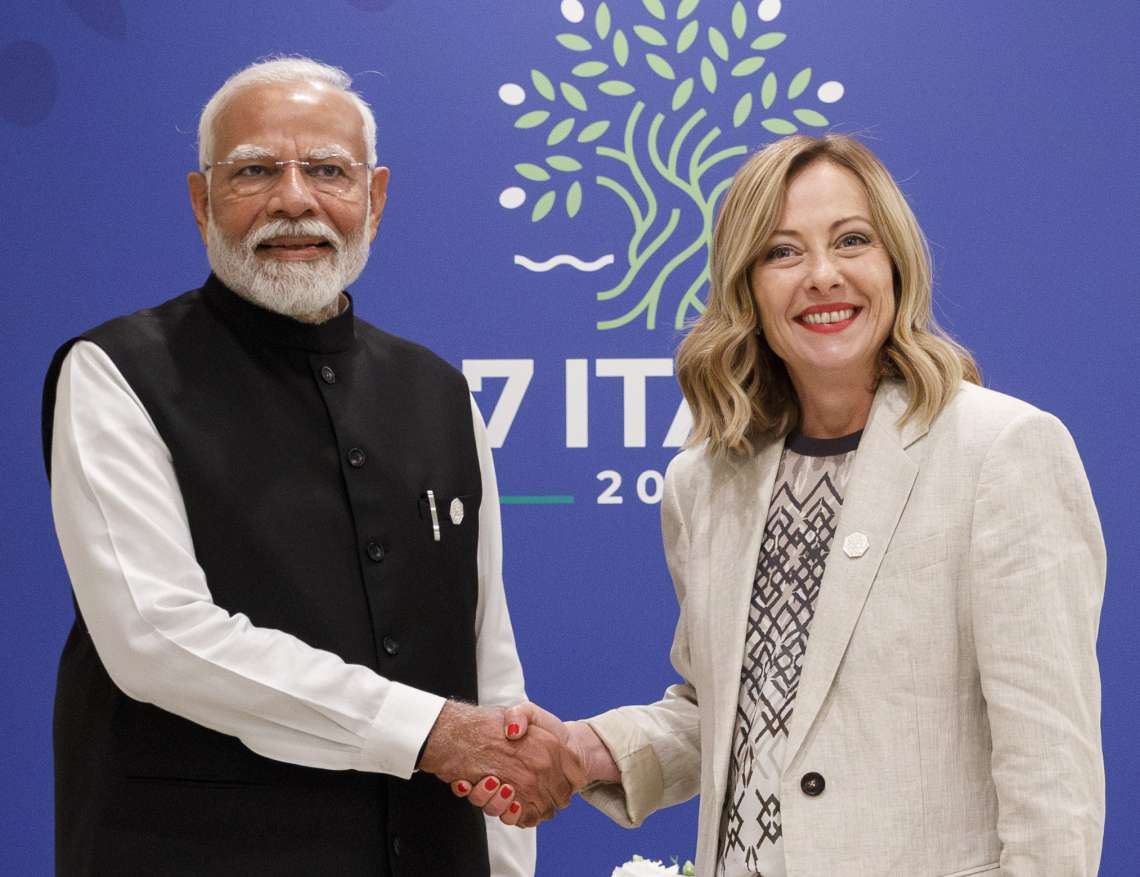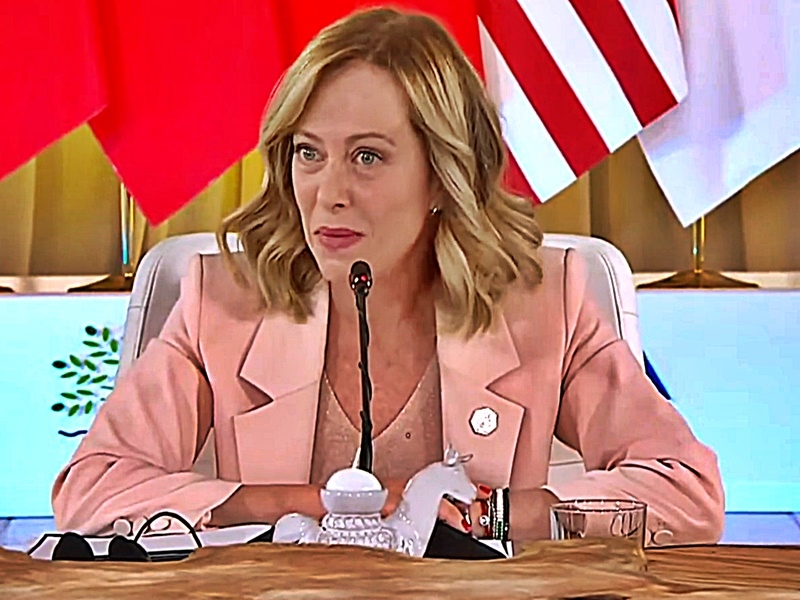European countries are increasingly focused on “de-risking” their economies and will be reluctant to increase their economic dependence on China.reports Asian Lite News
Italy’s withdrawal would deal another blow to the Belt and Road Initiative (BRI), which has already been scaled back as recipient countries grapple with debt distress, Chinese banks seek to reduce their exposure to risky loans, and China grapples with mounting domestic economic challenges, writes David Saks in Council for Foreign Relations.
David Sacks is a fellow for Asia studies at the Council on Foreign Relations (CFR).
European countries are increasingly focused on “de-risking” their economies and will be reluctant to increase their economic dependence on China, making it unlikely that any major economy will soon join the BRI, Saks said.
Italy appears poised to withdraw from the BRI, a reflection of frustrations with the initiative’s unmet promises and the country’s strategic reassessment of China.
Italy’s withdrawal from the Belt and Road Initiative would reflect disappointment with the lack of economic benefits and a more fundamental strategic rethinking of China.
In 2019, during Chinese President Xi Jinping’s visit to Rome, Italy shocked the United States and Europe by becoming the first Group of Seven (G7) country to join China’s Belt and Road Initiative (BRI), the largest ever global infrastructure undertaking, Saks said.
It is not difficult to see why the BRI enticed Italy. Having suffered through three recessions within a decade, Italy was looking to attract investment and expand Italian exports’ access into China’s huge market.
At the time, many Italians felt abandoned by Europe, while its populist government was skeptical of the European Union (EU) and more than willing to turn to China to fulfill its investment needs. Italy saw an opportunity to leverage its political weight to sign on to the BRI in hopes of beating out others for Chinese attention and investments.
More fundamentally, Italian withdrawal from the BRI would reflect the growing transatlantic convergence on the challenge China poses, Saks said.
European countries increasingly view China as a rival rather than as a partner or competitor, while President of the European Commission, Ursula von der Leyen, recently argued that “the Chinese Communist Party’s clear goal is a systemic change of the international order with China at its centre”, pointing at the BRI as evidence.
Beijing’s support for Russia in its war against Ukraine has led many European governments, including Italy’s, to shed their illusions about China.
As it became clear that the BRI would not be an economic panacea, the Italian government began to reassess whether it should continue its membership. For the past year, Italian Prime Minister Giorgia Meloni has indicated that joining the BRI was a “big mistake” that she intended to correct by withdrawing from the initiative, Saks said.
Meloni cited the lack of benefits that accrued to Italy after joining the BRI, noting that “Italy is the only G7 member that signed up to the accession memorandum to the Silk Road, but it is not the European or Western country with the strongest economic relations and trade flows with China”.
Russian President Vladimir Putin’s invasion of Ukraine and Beijing’s alignment with Moscow have also restored geopolitics to a preeminent position and made European countries more skeptical of Beijing’s intentions.
Putin’s plans to attend Beijing’s upcoming Belt and Road Forum have also made clear the geopolitical nature of the BRI. Italy’s reversal on the BRI should therefore be seen as driven less by economic considerations and more by the new geopolitical reality facing Europe, Saks said.
BRI Partners Turn to IMF for Financial Relief
BRI countries are increasingly opting for bailouts from the International Monetary Fund (IMF), even though they often come with tough conditions, rather than trying to negotiate further relief from Beijing, wrote Michael Bennon and Francis Fukuyama in a recent article in Foreign Affairs.
Bennon is a Research Scholar and Manager of the Global Infrastructure Policy Research Initiative at the Center on Democracy, Development, and the Rule of Law at the Freeman Spogli Institute for International Studies at Stanford University.
Fukuyama is Olivier Nomellini Senior Fellow at the Freeman Spogli Institute for International Studies and Director of the Ford Dorsey Master’s in International Policy at Stanford University.
Among the countries that the IMF has intervened to support in recent years are Sri Lanka ($1.5 billion in 2016), Argentina ($57 billion in 2018), Ethiopia ($2.9 billion in 2019), Pakistan ($6 billion in 2019), Ecuador ($6.5 billion in 2020), Kenya ($2.3 billion in 2021), Suriname ($688 million in 2021), Argentina again ($44 billion in 2022), Zambia ($1.3 billion in 2022), Sri Lanka again ($2.9 billion in 2023), and Bangladesh ($3.3 billion in 2023).
Some of these countries resumed servicing their BRI debts soon after the new IMF credit facilities were put in place. In early 2021, for instance, Kenya sought to negotiate a delay in interest payments for a struggling Chinese-funded railway project linking Nairobi to Kenya’s Indian Ocean port in Mombasa.
After the IMF approved a $2.3 billion credit facility that April, however, Beijing began withholding payments to contractors on other Chinese-financed projects in Kenya.
As a result, Kenyan subcontractors and suppliers stopped receiving payments. Later that year, Kenya announced that it would no longer seek an extension of debt relief from China and made a $761 million debt service payment for the railway project, the article said.
Some analysts have argued that the BRI is not a cause of the current debt crisis in emerging markets.
Countries such as Egypt and Ghana, they point out, owe more to bondholders or multilateral lenders such as the IMF and World Bank than to China and are still struggling to manage their debt burdens. But such arguments mischaracterise the problem, which is not simply bad BRI debt in the aggregate, but also hidden BRI debt, the article said.
According to a 2021 study in the Journal of International Economics, approximately half of China’s loans to the developing world are “hidden,” meaning that they are not included in official debt statistics. Another study published in 2022 by the American Economic Association found that such debts have resulted in a series of “hidden defaults”.
The first problem with hidden debt occurs during the buildup to a crisis, when other lenders do not know that the obligations exist and are therefore unable to accurately assess credit risk.
The second problem comes during the crisis itself, when other lenders learn of the undisclosed debt and lose faith in the restructuring process. It does not take much hidden bilateral debt to cause a credit crisis, and it takes even less to shatter trust in efforts to resolve it.
China has taken some measures to ease the strain of these debts, hidden and otherwise. It has provided its own bailouts to BRI countries, often in the form of currency swaps and other bridge loans to borrower central banks.
These bailouts are accelerating, with one working paper published in March 2023 by the World Bank Group estimating that China extended more than $185 billion in such facilities between 2016 and 2021. But central bank swaps are far less transparent than traditional sovereign loans, which further complicates restructurings, the article said.
In its outreach to the Global South, China has institutionalized cooperation, provided serious financial support, and created domestic programs to more effectively implement policy.
In terms of institutionalisation, it has established the Forum on China-Africa Cooperation, the China-Arab States Cooperation Forum, and the China and the Community of Latin American and Caribbean States Forum, Michael Schuman, Jonathan Fulton and Tuvia Gering wrote for Atlantic Council.
Each of these forums has ambassador-level representatives, regular meetings, and working groups to facilitate policy coordination between China and other member states.
As for financial support, Beijing allocated nearly $42 billion to foreign assistance between 2013 and 2018, including grants, interest-free loans, and concessional loans. Of this, nearly 45 per cent went to Africa and 37 per cent to Asia.
In August 2022, China announced that it was waiving 23 interest-free loans to 17 African countries and also announced that it would redirect $10 billion of its IMF reserves to African countries, the article said.
At the same time, China has emerged as “the lender of last resort” to developing countries, undertaking 128 bailout operations in 22 countries between 2020 and 2021, for a total of $240 billion.
An important consideration, however, is the cost of a Chinese rescue loan: With interest rates at 5 per cent, it is more than double the 2% from the IMF, the article said.
Debt restructuring is a serious concern in the Global South, and how the PRC addresses it is being closely monitored. Sri Lanka, for example, owes China $7.4 billion, nearly a fifth of the country’s public debt. In Africa, Chinese lenders account for 12 per cent of external debt, valued at $696 billion, it added.
As the continent faces an array of challenges, ranging from climate change to political instability and economic inequality, experts disagree on how big an impact G20 membership will have as the African Union joins 20 of the world’s largest economies, VOA reported.
Robert Besseling, chief executive officer of Pangea-Risk, an intelligence advisory group based in South Africa and Britain, told VOA it is more of a symbolic development than a substantive event.
“The AU seat at the G20 will be meaningless,” Besseling said, if the African body cannot react decisively to events that include “the spree of military coups and irregular elections that have set back Africa’s democratic trajectory in recent months.”
Seven African countries have experienced military-led coups since 2020, most recently Gabon and Niger, raising questions about political stability, the lack of which makes it harder to address pressing issues like terrorism and food shortages in many countries, VOA reported.
Dennis Matanda, adjunct professor of American politics and international business at Catholic University said that Africa’s membership in the G20 could pay dividends, VOA reported.
Besseling, however, has doubts about the AU’s ability to act cohesively. He also said the AU’s membership in the G20 is mainly driven by tensions on the world stage between competing alliances.
“The G20 is increasingly becoming a counterweight to the China-led BRICS, and the AU’s entry should be viewed in that same context of geopolitical rivalry,” Besseling said, VOA reported.
On a more positive note, Besseling said the AU’s entry into the G20 may help diversify global alliances and open new avenues for cooperation.
Matanda said it is time for African nations to defend their own interests and not be used to further the objectives of global powers.
“I think we need to stop thinking about what the other places want, what China wants, what Europe wants, and start the process of generating Africa’s own narrative,” Matanda said, VOA reported.














